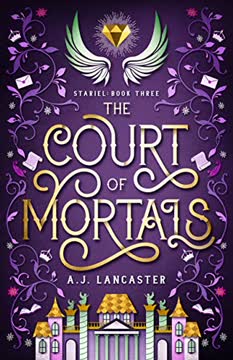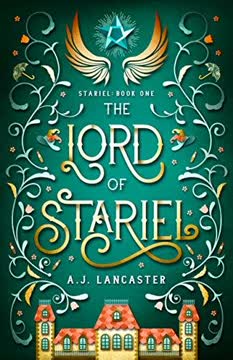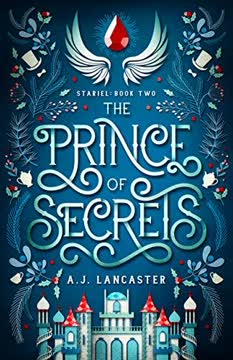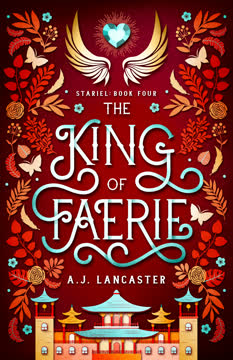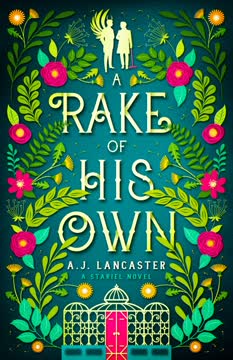Plot Summary
Storms and Scandals Begin
Hetta Valstar, newly chosen as the lord of Stariel, struggles to balance the estate's mundane troubles with the magical and social storms brewing around her. Her relationship with Wyn, the estate's fae steward, is the subject of family gossip and societal scandal, especially after a public kiss. Hetta's authority is constantly challenged by relatives and tenants, while her own heart is torn between duty and desire. The estate itself, a sentient faeland, is restless, reflecting Hetta's inner turmoil. As she tries to assert herself, she's pulled into the deeper currents of fae politics, where debts and promises have dangerous consequences. The chapter sets the tone: personal and political storms are about to collide, and Hetta's choices will ripple far beyond her own life.
Fae Debts and Summons
Wyn, Hetta's lover and Stariel's steward, is summoned by Princess Sunnika, his former fiancée and a powerful fae. The favor he owes her is called in, dragging him back into the dangerous web of fae court politics. Their meeting is tense, full of unspoken history and the threat of manipulation. Sunnika's questions about the Spires—Wyn's home court—hint at greater troubles brewing in Faerie. Wyn's loyalty to Hetta is tested, as is his ability to keep her and Stariel safe from fae machinations. The chapter explores the cost of fae debts, the fragility of trust, and the ever-present danger of being caught between two worlds.
Bats in the Attic
Hetta is confronted with a practical problem: fae bats, or piskies, have infested the Dower House, halting repairs vital to the estate's finances. Her land-sense reveals the true nature of these creatures, and she negotiates their relocation, balancing compassion with necessity. The incident is a microcosm of the larger changes sweeping the world: the boundaries between Faerie and Mortal are thinning, and magical beings are crossing over in increasing numbers. Hetta's ability to mediate between human and fae concerns is tested, foreshadowing the greater challenges to come.
Lovers and Lightning
Hetta and Wyn steal a moment together, their passion complicated by the estate's intrusive magic and the ever-watchful eyes of family and faeland. They experiment with their powers—Hetta's fire, Wyn's storm—testing the limits of control and trust. Their intimacy is both a source of strength and vulnerability, as Stariel's magic amplifies their emotions and the land itself seems to conspire to keep them apart. The chapter is charged with longing, frustration, and the sense that personal happiness is always at risk in a world where magic and politics intertwine.
Portals and Politics
A magical experiment at the Standing Stones goes awry, and a portal to the Court of Ten Thousand Spires nearly reopens, threatening to pull Wyn back to his dangerous birthright. The incursion is repelled, but not without cost—Hetta and Wyn are reminded that their love is not just their own business, but a matter of fae and mortal politics. The arrival of Lord Penharrow, Hetta's former suitor and now a political rival, brings old wounds and new complications. The estate's future, and Hetta's personal happiness, are increasingly entangled with the fate of two worlds.
Old Flames, New Wounds
Hetta is forced to confront Angus Penharrow, her ex-fiancé, whose betrayal nearly cost her the estate. Their tense conversation reopens old wounds but also reveals Angus's lingering feelings and his jealousy of Wyn. Angus's attempts at reparation are complicated by his involvement in the political machinations swirling around Stariel. The chapter explores the pain of broken trust, the difficulty of forgiveness, and the way personal history can be weaponized in the struggle for power and belonging.
Rivals and Revelations
Wyn and Angus face off, each staking a claim to Hetta's loyalty and the future of Stariel. The confrontation is as much about pride and power as it is about love. Wyn's fae nature is revealed to Angus, shattering any illusions of a simple rivalry. The encounter forces Hetta to reckon with the consequences of her choices—who she loves, who she trusts, and what she's willing to risk for both. The chapter is a crucible for character, burning away pretense and leaving only raw, complicated truth.
Land, Law, and Loyalties
Hetta grapples with the practicalities of running Stariel—managing tenants, negotiating with the bank, and prioritizing repairs. The estate's survival depends on her ability to balance tradition with innovation, and personal desire with public duty. The land itself is restless, its magic responding to her emotions and choices. The chapter underscores the theme that leadership is as much about mundane decisions as it is about grand gestures, and that loyalty—to land, family, and self—is always under negotiation.
Unseen Enemies
As Hetta and Wyn navigate the challenges of estate and heart, unseen enemies move against them. Rumors and gossip spread, fueled by those who would see Hetta fail. The press, led by Lady Peregrine's Society News, threatens to expose secrets that could destroy reputations and alliances. Hetta's family is caught in the crossfire, and the line between friend and foe blurs. The chapter is a study in the power of perception, the danger of secrets, and the vulnerability of those who stand at the intersection of worlds.
Royal Summons
Hetta receives a summons from Queen Matilda, demanding her presence—and Wyn's—at court. The journey to Meridon is fraught with anxiety, as the stakes of their relationship become national, even international. The queen's interest is not merely personal; it is political, and the fate of Stariel, and perhaps all of Prydein, hangs in the balance. The chapter is a turning point, as private love becomes public business, and the characters are forced to play on a much larger stage.
Chains and Choices
At court, Wyn is forced to wear dismae—iron cuffs that suppress his magic—making him vulnerable and isolated. The queen's suspicion and the threat of scandal put both Hetta and Wyn under intense scrutiny. Their love is tested by external pressures and internal doubts. The chapter explores the cost of compromise, the pain of powerlessness, and the necessity of making choices even when all options are fraught with danger.
Theatre of Intrigue
In Meridon, Hetta reconnects with her old theatre company, finding solace and perspective among friends who knew her before she was a lord. The theatre becomes a microcosm of the larger political drama, with secrets, alliances, and betrayals playing out both on and off stage. The chapter is a meditation on identity, performance, and the ways we craft our own stories even as we are swept up in others'.
Gossip and Consequence
The press intensifies its attacks, and Hetta's reputation is on the line. The source of the rumors is traced to powerful enemies with personal and political motives. The consequences of public perception become painfully real, threatening not just Hetta and Wyn's happiness, but the stability of Stariel itself. The chapter is a reminder that words can wound as deeply as swords, and that the battle for truth is never easily won.
Fae Courts Collide
The boundaries between Faerie and Mortal continue to erode, and the rival fae courts—DuskRose and ThousandSpire—maneuver for advantage. Wyn's siblings arrive, each with their own agendas and grievances. The struggle for the Spires' throne intensifies, and Hetta and Wyn are caught in the crossfire. Loyalties are tested, alliances shift, and the fate of both worlds hangs in the balance.
Nightwyrm in the Palace
A monstrous fae creature, the nightwyrm, is unleashed in the palace, targeting Wyn and endangering everyone. The attack is a message from Aroset, Wyn's ruthless sister, now vying for the Spires' throne. Wyn's vulnerability—stripped of magic by the dismae—forces him to rely on wit, courage, and the help of unlikely allies. The chapter is a harrowing ordeal, blending action, horror, and the high cost of fae politics.
Aftermath and Accusations
In the wake of the nightwyrm's rampage, blame falls on Wyn, fueled by planted evidence and political enemies. Hetta fights to clear his name, but the web of suspicion tightens. The queen's trust is shaken, and the threat of imprisonment or worse looms. The chapter is a study in the fragility of reputation, the ease of scapegoating, and the difficulty of proving innocence in a world where magic and malice are indistinguishable.
Allies and Adversaries
As the truth behind the attack emerges, Hetta and Wyn must rely on a shifting cast of allies—family, fae, and friends old and new. The lines between ally and adversary blur, as personal motives and political ambitions collide. The chapter is a dance of trust and betrayal, where every choice has consequences and every alliance is provisional.
The Spires' Claim
The Court of Ten Thousand Spires, desperate for a new ruler, reaches out for Wyn, seeking to bind him as its king. The pull is both magical and emotional, forcing Wyn to confront his past, his family, and his own desires. Hetta faces the possibility of losing him—not just to politics, but to the very land itself. The chapter is a crucible of identity, sacrifice, and the inescapable pull of destiny.
Sacrifice and Stasis
In a desperate bid to prevent Aroset's tyranny, Wyn, his siblings, and Hetta confront the Spires' magic. Catsmere, Wyn's sister, sacrifices herself to put the Spires into stasis, halting the succession war but at great personal cost. Wyn is torn between worlds, his connection to Stariel and the Spires stretched to breaking. The chapter is a meditation on sacrifice, the limits of power, and the price of peace.
Home and Heart
Returning to Stariel, Wyn and Hetta must reckon with the consequences of their choices. Marius, Hetta's brother, recovers from magical trauma, but the wounds—emotional and magical—run deep. The estate is both haven and battleground, a place where love and duty are in constant tension. The chapter is a quiet reckoning, full of longing, regret, and the fragile hope of healing.
Unbreakable Bonds
In the aftermath, Hetta and Wyn discover that their connection—personal and magical—is unbreakable. Stariel itself has claimed Wyn, binding him to the land and to Hetta in ways neither fully understands. The future is uncertain: the fae courts are in turmoil, the mortal world is changing, and new life is on the horizon. But in the face of loss and uncertainty, love endures, and the bonds they have forged will shape the fate of both worlds.
Characters
Hetta Valstar
Hetta is the newly chosen lord of Stariel, a magical estate straddling the boundary between the mortal and fae worlds. She is pragmatic, passionate, and often torn between her personal desires and the heavy weight of duty. Her relationship with Wyn is both her greatest strength and vulnerability, exposing her to scandal and political danger. Hetta's psychoanalytic core is her struggle for agency: she yearns for freedom but is bound by love, land, and legacy. Over the course of the story, she grows from a reluctant leader into a woman who can make impossible choices, sacrificing personal happiness for the greater good—yet never losing her capacity for love or her fierce sense of justice.
Wyn Tempestren
Wyn is a fae prince of the Court of Ten Thousand Spires, living in exile as Stariel's steward. He is marked by trauma—his father's cruelty, a broken oath, and the burden of fae politics. Wyn's love for Hetta is both redemptive and dangerous, pulling him into mortal concerns even as his past refuses to let him go. Psychologically, Wyn is defined by guilt, self-restraint, and a longing for belonging. His journey is one of self-acceptance: learning to wield his power without fear, to claim his place in both worlds, and to risk everything for love. His development is a dance between vulnerability and strength, culminating in a sacrifice that binds him to Stariel and Hetta in ways neither expected.
Rakken Tempestren
Rakken, Wyn's older brother, is a formidable fae—cunning, powerful, and driven by a hunger for the Spires' throne. He is both rival and reluctant ally, his relationship with Wyn fraught with jealousy, resentment, and a buried sense of familial loyalty. Rakken's psychoanalytic core is his need for control and recognition, shaped by a lifetime of competition and their father's manipulations. Over the story, his anger and ambition are tempered by loss and the realization that power cannot heal all wounds. His actions are unpredictable, but his grudging respect for Wyn and Hetta hints at a capacity for change.
Catsmere Tempestren
Catsmere, Rakken's twin, is a fierce warrior and strategist, her loyalty to family often at odds with her sense of duty to the Spires. She is pragmatic, unsentimental, and willing to make hard choices—including sacrificing herself to save her siblings and the faeland. Psychologically, Catsmere is defined by her protective instincts and her willingness to bear burdens others cannot. Her development is a study in self-sacrifice, the cost of leadership, and the quiet strength of those who fight not for glory, but for the survival of those they love.
Princess Sunnika
Sunnika, a princess of DuskRose and Wyn's former fiancée, is a master of fae politics—charming, calculating, and always several moves ahead. Her relationship with Wyn is complex: part rivalry, part genuine affection, part political maneuvering. She represents the seductive danger of fae courts, where every favor has a price and every alliance is provisional. Psychologically, Sunnika is driven by ambition and a desire for security in a world where power is always shifting. Her actions are never entirely predictable, and her help always comes with strings attached.
Marius Valstar
Marius, Hetta's brother, is a botanist and academic, more comfortable with books than with people. He is deeply loyal, often serving as the family's conscience and emotional anchor. Marius's psychoanalytic core is his struggle with self-worth and belonging, complicated by his sexuality and the dangers of being different in a conservative society. His latent magical abilities—telepathy and resistance to compulsion—emerge under pressure, forcing him to confront new aspects of himself. His journey is one of self-discovery, acceptance, and the quiet heroism of those who fight for family in their own way.
Alexandra Valstar
Alexandra, Hetta's younger sister, is marked by her ability to see through fae glamour—a gift and a curse. Traumatized by past compulsion, she is determined to reclaim agency and resist future manipulation. Her development is a coming-of-age arc: from frightened child to a young woman learning to wield her gifts and stand up to the dangers of both fae and mortal worlds. Her relationship with Hetta and Wyn is a source of both vulnerability and resilience.
Angus Penharrow
Angus, Hetta's ex-fiancé and neighboring lord, is a complex mix of charm, regret, and ambition. His betrayal of Hetta and Stariel is both personal and political, and his attempts at reparation are complicated by jealousy and lingering affection. Psychologically, Angus is driven by pride and a need for validation, but his actions reveal a capacity for growth and a grudging respect for Hetta's strength. He serves as a mirror for Hetta's own struggles with trust and forgiveness.
Queen Matilda
Queen Matilda is the ruler of Prydein, a woman balancing tradition, power, and the demands of a changing world. She is pragmatic, cautious, and not above using personal relationships for political ends. Her interactions with Hetta and Wyn are a chess game, each move calculated for maximum advantage. Psychologically, she is defined by her sense of duty, her protectiveness toward her daughter, and her willingness to adapt to new realities—even if it means embracing the fae.
Stariel (the faeland)
Stariel is more than a setting—it is a character in its own right, with desires, moods, and a will that shapes the story. It is fiercely protective of its lord and those it claims, often acting as an unseen matchmaker and guardian. Psychologically, Stariel represents the unconscious: the deep, primal forces that shape identity, belonging, and destiny. Its actions are sometimes helpful, sometimes meddlesome, but always driven by a desire to preserve itself and those it loves.
Plot Devices
Dual Worlds and Permeable Boundaries
The narrative structure hinges on the interplay between the mortal and fae realms, with Stariel as the liminal space where their boundaries blur. Portals, magical incursions, and the arrival of fae creatures in the mortal world serve as both literal and metaphorical devices, representing the collapse of old certainties and the emergence of new possibilities. The permeability of these boundaries is mirrored in the characters' own struggles with identity, loyalty, and belonging. Foreshadowing is woven through the land's restlessness, the press's rumors, and the recurring motif of storms—heralding change, danger, and the need for adaptation.
Political Intrigue and Social Scandal
The story uses the devices of court intrigue, social scandal, and public perception to heighten stakes and force characters into action. The press, gossip, and the threat of exposure are as dangerous as any magical attack, shaping reputations and alliances. The queen's summons, the threat of dismae, and the maneuverings of rivals like Angus and the Earl of Wolver create a web of tension that tests every relationship. The interplay of public and private, love and duty, is a constant source of conflict and growth.
Magical Bonds and Sacrifice
The magical bonds between land and lord, fae and mortal, lover and beloved are central plot devices. These bonds are both blessing and curse, granting power but demanding sacrifice. The climax hinges on the choice between personal happiness and the greater good, with Catsmere's self-sacrifice and Stariel's unexpected claim on Wyn serving as turning points. The story uses these devices to explore the limits of agency, the cost of love, and the possibility of forging new paths in a world where old rules no longer apply.
Analysis
The Court of Mortals is a rich, emotionally resonant fantasy that uses the collision of fae and mortal worlds to explore timeless questions of identity, loyalty, and sacrifice. At its heart, the novel is about the struggle to reconcile personal desire with public duty, and the ways in which love—romantic, familial, and communal—can both bind and liberate. The story's modern resonance lies in its depiction of a world in flux, where old certainties are crumbling and new alliances must be forged. The characters' journeys are deeply psychological, marked by trauma, growth, and the hard-won wisdom that comes from making impossible choices. The novel's ultimate message is one of hope: that even in the face of loss, uncertainty, and the collapse of boundaries, it is possible to forge new bonds, claim new identities, and build a future where love and duty are not mutually exclusive. The land itself, sentient and ever-watchful, reminds us that home is not just a place, but a living, evolving relationship—one that demands courage, honesty, and the willingness to embrace change.
Last updated:
Review Summary
The Court of Mortals receives mostly positive reviews, with readers praising the character development, world-building, and romantic elements. Many enjoy the blend of fantasy, romance, and political intrigue. Some criticize pacing issues and the pregnancy plot twist. Readers appreciate the witty dialogue and complex relationships between characters. The book's ending leaves many eager for the next installment. While some found it less engaging than previous entries, most consider it a strong continuation of the series, with particular praise for the audiobook narration.
